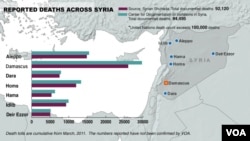WASHINGTON —
Syrian rebel groups are fighting each other. More than 1,000 people have died in the past two weeks in clashes among armed opposition groups. The infighting appears to be benefiting the government in Damascus.
It is the worst rebel-on-rebel violence since Syria’s civil war began nearly three years ago.
Opposition fighters are targeting the al-Qaida-linked Islamic State of Iraq and Syria [ISIS, which has been terrorizing civilians.
David Pollock, a senior fellow at the Washington Institute, said, “Torturing and executing people, and beating them up and forcing them to adopt their own extreme, really extreme, brand of Islam.”
And now there appear to be massacres. U.N. human rights officials say the mass executions could amount to war crimes.
William McCants of the Brookings Institution expects more to come.
“I think we are going to see a lot more of these kinds of atrocities committed because ISIS does not really have a conscience when it comes to fighting against its enemies, whether that is the regime or it is other Muslim fighters,” he said.
And now the Syrian war is spilling across borders.
In a dramatic revival of the Sunni insurgency, ISIS fighters have seized control of key parts of Iraq’s Anbar province.
The al-Qaida-linked rebels are trying to turn the region into one big battlefield.
Secretary of State John Kerry said, “We, too, are deeply concerned about the rise of extremism. The world needs no reminder that Syria has become the magnet for jihadists and extremists.
And the battles among rebels appear to be boosting the Syrian government.
Forces loyal to Syrian President Bashar al-Assad are gaining ground in the chaos of rebel-on-rebel fighting.
“Oh, they are certainly exploiting the fighting. The Syrian government forces have made a lot of gains in the last few days in Aleppo province and that is where the infighting has been most intense," said McCants.
Pollock said there is evidence of military cooperation between the Syrian government and some ISIS rebels. “The Syrian regime is not only exploiting this, but is actually behind it, is actually one of the responsible parties for trying to discredit and divide the opposition,” he said.
Western countries are hoping peace talks scheduled to begin January 22 will open up new paths for humanitarian aid and reduce violence.
Syria’s government has proposed a ceasefire in Aleppo.
Analysts question how that could happen.
“Even if the Syrian opposition coalition is able to come to some sort of terms with the Assad government, the fact that the largest fighting group, the Islamic Front, has denounced the negotiations means it is not worth the paper it is printed on if they have an agreement at the end of it,” said McCants.
Despite diplomatic efforts, rebels vow to continue the fight in Syria.
And after weeks of insurgent infighting, it appears the government’s position is only getting stronger.
It is the worst rebel-on-rebel violence since Syria’s civil war began nearly three years ago.
Opposition fighters are targeting the al-Qaida-linked Islamic State of Iraq and Syria [ISIS, which has been terrorizing civilians.
David Pollock, a senior fellow at the Washington Institute, said, “Torturing and executing people, and beating them up and forcing them to adopt their own extreme, really extreme, brand of Islam.”
And now there appear to be massacres. U.N. human rights officials say the mass executions could amount to war crimes.
William McCants of the Brookings Institution expects more to come.
“I think we are going to see a lot more of these kinds of atrocities committed because ISIS does not really have a conscience when it comes to fighting against its enemies, whether that is the regime or it is other Muslim fighters,” he said.
And now the Syrian war is spilling across borders.
In a dramatic revival of the Sunni insurgency, ISIS fighters have seized control of key parts of Iraq’s Anbar province.
The al-Qaida-linked rebels are trying to turn the region into one big battlefield.
Secretary of State John Kerry said, “We, too, are deeply concerned about the rise of extremism. The world needs no reminder that Syria has become the magnet for jihadists and extremists.
And the battles among rebels appear to be boosting the Syrian government.
Forces loyal to Syrian President Bashar al-Assad are gaining ground in the chaos of rebel-on-rebel fighting.
“Oh, they are certainly exploiting the fighting. The Syrian government forces have made a lot of gains in the last few days in Aleppo province and that is where the infighting has been most intense," said McCants.
Pollock said there is evidence of military cooperation between the Syrian government and some ISIS rebels. “The Syrian regime is not only exploiting this, but is actually behind it, is actually one of the responsible parties for trying to discredit and divide the opposition,” he said.
Western countries are hoping peace talks scheduled to begin January 22 will open up new paths for humanitarian aid and reduce violence.
Syria’s government has proposed a ceasefire in Aleppo.
Analysts question how that could happen.
“Even if the Syrian opposition coalition is able to come to some sort of terms with the Assad government, the fact that the largest fighting group, the Islamic Front, has denounced the negotiations means it is not worth the paper it is printed on if they have an agreement at the end of it,” said McCants.
Despite diplomatic efforts, rebels vow to continue the fight in Syria.
And after weeks of insurgent infighting, it appears the government’s position is only getting stronger.





